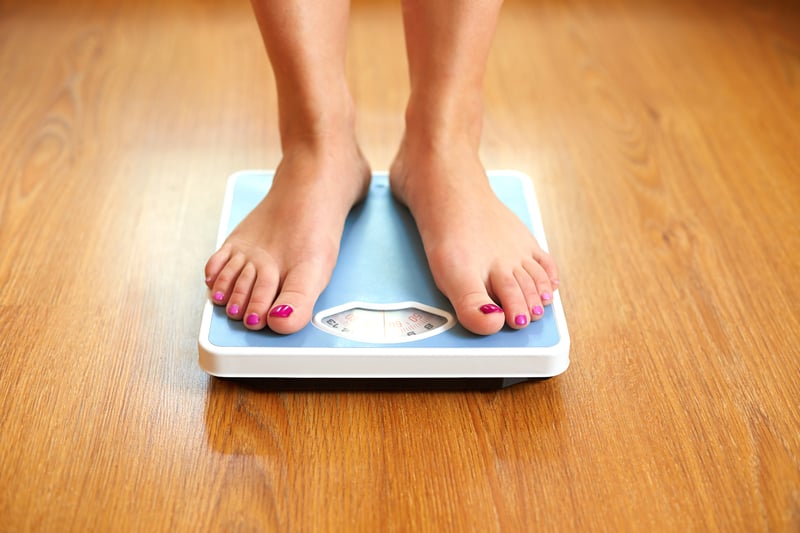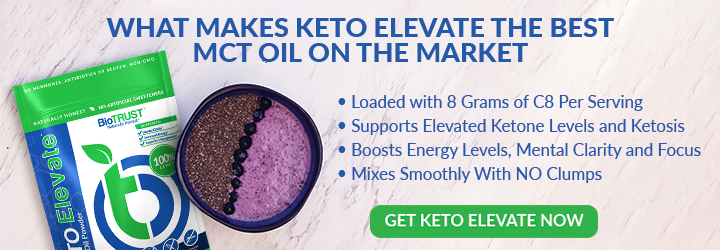15 Diet Myths We Need to Stop Believing ASAP

No matter why you want to lose weight—for health reasons, to fit into your favorite jeans, to keep up with your kids, to look great at a reunion or wedding, or to feel more energetic and vibrant, etc.—chances are you want to see results as quickly as possible. Fortunately, information around losing weight is all around us. Unfortunately, we’re also surrounded by so many diet myths which not only prevent us from keeping the weight off, but could potentially slow or halt our results altogether. Worse, with so much misinformation around, it can be difficult to even know where to start.
While fad diets and crash diets are abundant, losing weight rapidly is not only difficult, it can be harmful. So, if you see a diet claiming to help you lose, say, 10 pounds in 10 days, remember, if it sounds too good to be true, it probably is.
Yes, some people can lose weight rapidly and may even see those 10 pounds drop, especially if they have a lot of weight to lose. However, losing weight that quickly is more likely water weight than fat loss. And that’s the real goal: to lose body fat, while maintaining or gaining lean body mass. And to accomplish that, it takes time, effort, smart nutrition and exercise, and probably some patience.
Dieting isn’t always easy, but it can be much more fruitful and enjoyable if you can skip past the common diet myths and go with what really works.
15 Diet Myths to Banish From Your Brain
Myth 1: Weight Loss = Fat Loss
If only this myth were true… unfortunately, when you first start seeing the numbers on the scale drop, chances are good that it’s not necessarily fat loss. Instead, it’s likely water weight, especially if you have recently decreased the amount of carbs consumed.
In addition, if you see weight increase quickly, it could be the result of eating more sodium than usual or hormone changes that are beyond your control.
To help support your body’s fat loss, counterintuitively, it’s a good idea to increase water intake when you start dieting. This is especially true if you’re increasing the amount or intensity of exercise you are doing.
Myth 2: You Can Target Your Trouble Spots
“I hate my thighs…” (or belly or bat wings), so I’ll just train that section really hard. Sadly, spot training has never worked. You can’t just sit on the adductor machine for hours to slim those thighs or do thousands of crunches for a flatter stomach.
Instead, you’ll need to follow a smart diet plan that creates a moderate calorie deficit to lose fat from your entire body. Until you lose that weight, you won’t know where the weight loss will come from. Every body is different.
That said, it is possible to sculpt specific muscles, so as the fat does come off, you’ll be able to see the results of your training efforts—from more toned curves in your thighs to the flat muscles in your abdomen to the horseshoe-shaped muscle on the back of the arms. Ultimately (i.e., once you’ve lost enough fat), this can help those specific areas look even leaner and more toned.
Myth 3: Cleanses Lead to Rapid Weight Loss
One of the most popular diet myths is that our bodies need help cleansing, so it’s important to go on a highly restrictive diet at least a couple of times a year to “clean out.” Along with this recommendation is often an intense juice cleanse and perhaps some fairly harsh supplements to help clear out the digestive system.
And it is true that you’ll likely “clear out” (i.e., poop a lot). But that doesn’t necessarily translate to improved health or fat loss.
In fact, many of these diets are not only highly restrictive, but they provide a big dose of liquid sugar (in the form of fruit juice), which can lead to blood sugar spikes and crashes. Another caveat is that these are often very low in calories, leading to increased hunger, headaches, lack of energy, and just feeling bleh.
Worse, the deprivation can lead you to overeat once the cleanse is complete combined with a decrease in metabolism as your body strives to hold onto calories since it’s no longer sure when the next meal is coming its way.
Yes, to lose weight, you will need to create a calorie deficit, but going to extremes typically backfires. Any weight loss is short lived (and often just water weight), leading you back to even more weight gained than you lost. Plus, it’s not a very fun way to diet, and you could also be missing out on important nutrients your body needs to function optimally.
Myth 4: Cut Calories Drastically to Lose Weight
You don’t need to follow a cleanse diet to fall for the promises of a crash diet. Just drop calories to under 1,500, 800, or even 500, and you’ll drop lbs fast. Seems logical. Unfortunately, it’s much more likely to set you up for complete diet failure and long-term health consequences than help you lose fat.
As mentioned previously, diets like this can lead to nutritional deficiencies, they’re impossible to follow long term, and getting less fuel than your body needs leads to decreased energy levels, headaches, and simply feeling bad. And over the long run, your body will start digging into your muscle mass and decrease metabolism to help you survive.
Instead, moderately decrease calories to no more than 10 to 20% less than you need to maintain your weight. For example, if you’re a 195-pound fairly active man around 45 years old, you would need around 2,600 calories to maintain weight. So, you can find sustainable weight loss by decreasing calories down to between 2,080 and 2,340 calories.
If you’re an average woman in America between the ages of 40 and 59, you weigh 176.4 pounds. To maintain that weight with a moderately active lifestyle, you would consume ~2,095. To begin to lose weight, you could drop your calories to between 1,676 and 1,885. Alternatively, you could eat about the same and increase the number of calories you burn per day by increasing your activity levels throughout the day.
Be sure to make smart nutrient-dense choices, including eating plenty of fresh vegetables, fruits, quality proteins, and slow-burning carbohydrates (e.g., whole grains, fiber-rich starchy vegetables, and legumes) to help you stay full for longer.
Myth 5: All That Matters is Calories In, Calories Out
Yes, there is some truth to weight loss being a numbers game. However, if that’s the only focus, you can end up trading in nutrient-dense foods that will keep you full and satisfied (like whole eggs and avocado on rye toast) for foods that are low in calories as well as nutrients (like rice cakes and egg whites). Big mistake. All calories are not created equal, folks.
Eating a nutrient-rich diet and choosing foods that satisfy your tastebuds as well as your tummy will help you stick to your plan for long-term weight loss. It will also fuel your body by providing the many nutrients you require for your busy lifestyle.
Myth 6: Eat Whatever You Want As Long As You Exercise
Sadly, you can’t out exercise a bad diet. The math just doesn’t work out. It would take hours to work off just a few slices of pizza—and if you have a thing for high-calorie junk food, you’ll never be able to burn off those excess calories, even with hours on the treadmill.
Plus, you aren’t doing much good for your training if all you’re eating are empty calories. Instead, food is fuel to provide energy for you throughout the day—including as you exercise. Diet to lose weight; exercise to improve fitness (among dozens of other benefits). They both fit brilliantly together for a healthier, happier lifestyle. But one can’t overcome a lack of the other.
BREAKING: Forget Taking Collagen, Try This 21-Second Trick for Healthier Skin & Hair Instead
Myth 7: Eat Whatever You Want That is Low Fat, Low Carb, Sugar Free or Diet
If this diet myth were true, wouldn’t we all be at our ideal weight? No matter which “healthy” claim you find on a food, the food isn’t likely to be calorie free. In fact, many of the worst offenders are just packaged, processed foods that won’t add anything to your diet, despite their label claims.
Skip the healthy choice, keto, sugar-free cookies—or at the very least, ensure you’re sticking with a single serving—and make better healthy whole food choices most of the time. You’ll enjoy better tasting, more satisfying meals that will keep you energized throughout the day.
Myth 8: It Takes Willpower to Lose Weight
“I’m just not motivated enough…” “I don’t have the willpower to resist temptation…” How often have you heard or perhaps used these excuses? If you are using willpower alone to diet, you may succeed in the short-term, but when you’re tired, stressed, or just having a bad day, willpower will inevitably fail you.
Instead, to lose weight for the long-term, put your organizational skills to use rather than relying on willpower. That is, prepare yourself, your kitchen, your work areas, and even your car for success. Ensuring you have healthy foods that are easy and convenient to eat, limiting access to foods that don’t fit into your plan, prepping meals, and scheduling your workouts can go a long way toward building solid habits to get you to your goals. Minimal willpower needed.
Myth 9: Weight-Loss Results are Immediate
Some people may see the results of their efforts within days of beginning a new fitness lifestyle. But that isn’t true for everyone. Some people may, in fact, not see any results on the scale for a month or more. Even after loading up their grocery carts with healthy, nutrient-dense foods, exercising consistently, and doing everything “right,” the scale may not budge for a while or ever.
First off, the human body is nothing if not complicated. And all of us are different. Weight loss comes from our unique metabolism, hormones, environments, and perhaps health conditions. What’s more, when you begin exercising, you may also be putting on some solid muscle, which can increase your overall weight.
Don’t just rely on scale weight. Find other ways to measure your success. From non-scale victories to body composition changes and especially to how you feel. Are you enjoying more focus, greater energy levels, improved skin health, better resistance to common colds, looser jeans—all of which can result from enjoying a healthier diet and exercise plan?
If you do have a lot of excess weight, it will eventually come off. It just may take more time. Be patient and consistent, and soon, you may find you are enjoying greater health than ever before.
Myth 10: Always Eat OR Always Skip Breakfast
How did one meal become so controversial? If you’re intermittent fasting, you may be choosing to skip breakfast. If you wake up starving, you may be choosing to eat breakfast. Which is right? It depends. On YOU. That is, some people wake up hungry. A good, solid breakfast helps them wake up, feel energized, and staves off temptation throughout the rest of the day. Other people find they need nothing more than a cup of coffee or green tea during the early hours of the day, and hunger doesn’t come knocking until noon or so.
Intermittent fasting (or fasting in general) has been found to have numerous benefits on blood sugar levels and inflammatory markers, for example. Eating breakfast, on the other hand, has also been shown to provide health benefits like improved nutrition, increased energy and concentration levels, and a mood boost.
The key is to learn to tap into your own hunger cues, listen to your body and preferences, and eat to fuel your day rather than to follow a diet rule that works great for some and not so well for you. Eat breakfast if you want. Or skip breakfast if that works best for you.
The only caveat is that breakfast is needed for children, adolescents, pregnant women, and people with certain health issues.
Myth 11: Health Supplements Are a Waste
Despite the fact that three out of four Americans use dietary supplements daily (according to the FDA), many people believe supplements offer little benefit. Eating a healthy, nutrient-rich, well-rounded diet is one of the most important things you can do for your health. Yet supplements also have a role to play, and many have been shown in research to provide significant benefits. Some of the most relevant supplements to consider when following a weight-loss diet, for example, include:
- Protein powders, which make it easy to get the protein your body needs to maintain lean mass, which can help you gain strength and improve metabolic rate.
- Probiotics can help support gut health, which in turn may help support weight-loss efforts.
- Turmeric (or curcumin), which helps the body maintain healthy levels of inflammation.
- Omega-3 fatty acids, which provide a wide range of health benefits, including helping decrease appetite.
You may have also heard the myth that supplements are not FDA regulated. However, they are very much regulated. The FDA just regulates dietary supplements as foods rather than as drugs. That said, as in any industry, there are some bad actors, so it’s important to choose supplements from a quality brand that uses only premium, natural ingredients and tests to ensure every ingredient is pure and potent.
SPECIAL OFFER: Ageless Turmeric Supports Healthy Inflammation Levels & Detoxification. Now Up to 71% Off.
Myth 12: Skinny People Are Healthy
Normal weight, skinny, or lean people are healthier than heavier people is one diet myth that needs to go. It is true that being overweight leads to increased risks of health issues, especially as your weight becomes obese and as you age. However, on the other end of the spectrum, being ultra-lean or anorexic can also lead to increased health risks. Beyond that, though, it’s difficult to know how healthy a person is depending on their weight. And some people naturally carry more weight than others.
Instead of focusing on the scale, if health is your goal, then it’s much more important to consume a nutritious diet and enjoy an active lifestyle. If you follow those behaviors, you’ll likely naturally improve your body weight and body composition. But even with the same lifestyle, some people maintain a higher body weight than others.
Myth 13: All Smoothies Are Healthy
A quality high-protein, nutrient-dense smoothie is a great way to get in a nutritious meal quickly and easily, but of course, not all smoothies are created equal. In fact, many smoothies are loaded with excess sugar and calories and are little better than junk food.
To ensure you’re drinking a healthy smoothie, make a quality protein source the center of your smoothie, and then watch for high calorie additions. Toss in only a few nuts and seeds or a small spoonful of nut butter and just one serving of fruit to avoid going overboard on calories.
To get you off to a good start, here are some of our favorite smoothie recipes.
Myth 14: You Need to Lose a Lot of Weight for Health Benefits
Again, the scale isn’t the best tool to measure overall health. However, for people who are overweight or obese, a small 5 to 10% decrease in weight can provide a big health boost. That means, for example, a 195-pound person can enjoy benefits by losing a mere 10 to 20 pounds.
It also doesn’t matter how quickly or slowly the weight comes off. It can be easier for some people to slowly change habits to lose the weight, but others enjoy the motivation that comes from seeing more rapid results. Again, it’s important to choose a plan and path that works for you, your personality, and your preferences.
Myth 15: Weight Regain is Inevitable
Another common and very destructive diet myth is that it’s impossible to keep off the weight once it’s lost. Why bother then, right?
It’s true that water weight can come back seemingly even more quickly than it was lost, but by following a quality weight-loss strategy consistently, keeping the weight off can become easier over time as your tastes change, you eat more mindfully, and you make other healthy choices and lifestyle changes.
Diet Myths We Need to Stop Believing: A Recap
Losing weight is hard. Keeping it off is hard. And it’s harder still if you believe in some of the diet myths that surround how to eat, when to eat, and what to eat to drop pounds.
Let the quick fix, fad diets fall off a cliff (where they belong) and understand that real success takes consistent hard work and patience. And not everyone loses weight at the same rate. Weight loss is, unfortunately, harder for some people than for others due to genetics, hormones, and other factors.
If you run into a diet that’s all about rules and restrictions, run. That’s diet dogma rather than guidelines for success. Again, there are good diets out there, but some may work better for some people than for others.
That said, fat loss is possible with the right strategies, consistent effort, and time. And we’re here to help you every step of the way!






 7 Signs Your Body is Seriously Low on Collagen (not just wrinkles)
7 Signs Your Body is Seriously Low on Collagen (not just wrinkles) Health Expert: "Turmeric Doesn't Work (unless...)"
Health Expert: "Turmeric Doesn't Work (unless...)" 3 Warning Signs Your Probiotic Supplement is a Total Waste
3 Warning Signs Your Probiotic Supplement is a Total Waste

